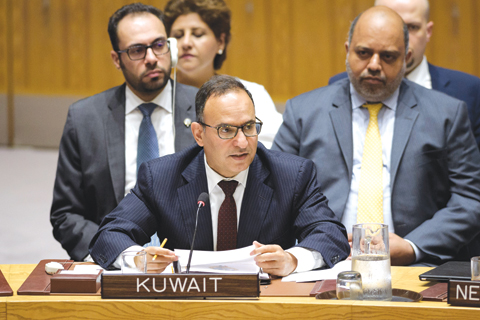Military option in Idlib would have catastrophic consequences: Otaibi
 Mansour Al-Otaibi
Mansour Al-OtaibiNEW YORK: The crisis of the Rohingya minority proved to be of the worst in modern history, Kuwait said late Tuesday. With the Muslim minority being subjected to killing and torture, the least that can describe such acts is ethnic cleansing, said the Permanent Representative of the State of Kuwait to the United Nations Ambassador Mansour Al-Otaibi. This came in a speech Otaibi delivered at a meeting for the UN Security Council on Myanmar. "The world is following our session and expects from us; at least, to hold our moral and humanitarian grounds regardless of any political considerations," he noted.
More than 887,000 Rohingya refugees have been displaced since August last year, as they joined some 300,000 other refugees who have fled Myanmar to Bangladesh, he added. On April 24 this year, members of the Security Council arrived in the city of Cox's Bazar, Bangladesh, to assess the tragic situation faced by more than 1.2 million people in need of humanitarian assistance. "This session comes a day after the fact-finding committee issued its report documenting the genocide-level crimes, war crimes and crimes against humanity that took place in Myanmar," he said. "These findings were in line with what we have seen on ground in Rakhine State, in addition to statements by eyewitnesses Cox's Bazar."
Reiterating condemnation of such acts that go counter to international laws and norms, Ambassador Otaibi underlined the necessity for the Government of Myanmar to shoulder its responsibility, either in terms of protecting its people and/or refraining from the use of disproportionate military force. Otaibi also expressed his appreciation to the Government of Bangladesh in regards to the crisis of the Rohingya refugees; whom more than 50 percent are children, in addition to some 31,000 women solely caring for their families. Kuwait, the United Kingdom and the Republic of Peru led the Security Council on the April 2018 field visit to Bangladesh and Myanmar.
Catastrophic consequences
Separately, Kuwait said before the UN Security Council late Tuesday that a military option in Syria's Idlib would have catastrophic humanitarian consequences, especially with half of the governorate's population are internally-displaced.
Diplomatic efforts need to be doubled on the highest of levels in order to avoid carnage and not re-live the bloody scenarios in Aleppo and Eastern Ghouta, Otaibi said. "Eyes are on Idlib, resided by some three million people. Any military escalation would worsen the already dire humanitarian crisis. It is sad and frustrating at the same to see the Council resolution not being implemented on ground," Ambassador Otaibi said in reference to resolution 2401, which was unanimously adopted by the UN Security Council last February and called for immediate cease-fire and facilitating entry of humanitarian assistance. "Resolutions unimplemented are worthless ones. History once again will witness incompetence of the UN Security Council in light of loud breaches of international humanitarian law and international law for human rights throughout the Syrian crisis," Otaibi stated. - KUNA










